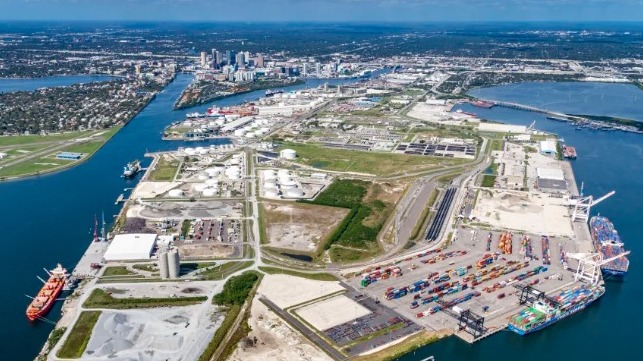
While Florida’s seaports experienced a significant loss of trade and revenue in 2020, a new report shows that the state’s seaports are poised for a recovery in 2021. Leading the recovery is the strong growth in cargo volumes that started in the second part of 2020 and the recent gradual restart of the cruise industry, which makes up an important part of the operations of Florida’s ports.
The value of waterborne trade was off more than $14 billion in 2020 at Florida’s 15 seaports according to the annual report from the Florida Seaports Transportation and Economic Development Council (FSTED). Required under Florida law, the report provides data on cargo and cruise activity as well as planned capital investments used to inform Florida policy and its lawmakers.
“We knew it was going to hit cruise — obviously with that being shut down — but cargo was obviously a little bit of a rude awakening, to see the impact on that,” said Michael Rubin, president and CEO of the Florida Ports Council. “The good news, again, is that cargo is back up, and it seems to be doing well.”
The report confirms that as with most port operations around the United States, that most of the declines came in the first part of the year due to the uncertainty around COVID-19. The recovery occurred in the fall, but still most of Florida’s ports experienced declines for the year.
In total the report says the value of trade decreased more than 16 percent in 2020, but three ports on the west coast and in the Panhandle of Florida reported gains in container volumes for the year. Those included Port Manatee, Port Tampa Bay, and Port Panama City. Breakbulk cargo also experienced an overall year-over-year increase, growing 8.8 percent to 7.8 million tons in 2020.
South and Central American and the Caribbean remained Florida’s top trade partner regions and accounted for a larger percentage of total trade in 2020 than in 2019. Japan topped China as Florida’s leading import trade partner country in 2020 for the second year in a row.
With COVID-19 bringing cruise sailings to a halt in 2020, Florida’s 158,992 cruise-related jobs, and $8.1 billion in economic activity were severely impacted. The cruise industry remained shut down for more than 15 months and has become the focus of an ongoing legal battle between the state of Florida and the US Centers for Disease Control prevention over the level of restrictions placed on the industry and the financial harm it is causing the state. Despite the current challenges to cruise operations in Florida, the report, however, concludes that the fundamentals of the cruise industry remain strong. They believe the combination of pent-up demand and widespread vaccinations will result in a full, long-term recovery for the industry.
“While most individual seaports experienced declines consistent with the overall trend for 2020, Florida’s 15 seaports are resilient, and we expect to see a near complete recovery in 2021,” said Michael Rubin, FSTED Program Administrator. “With $3.3 billion in capital improvements at Florida’s seaports identified over the next five years, we expect our ports to continue playing a leading role in job creation and economic growth.”
Of the $3.3 billion in seaport capital improvements identified over the next five years, 70.7 percent ($2.3 billion) is slated for the Atlantic coast seaports, with the remaining 29.4 percent ($972.8 million) dedicated for the Gulf Coast seaports. Among the projects slated are rehabilitation and repairs for berths, construction of new cruise and cargo terminals, and channel and harbor deepening efforts.
Florida’s governor also announced that he plans to devote $250 million from the federal stimulus monies to the ports. Florida’s Department of Transportation will select the ports and projects to receive the federal aid.
SOURCE READ THE FULL ARTICLE
https://www.maritime-executive.com/article/florida-s-ports-lost-14-billion-in-trade-in-2020-due-to-the-pandemic